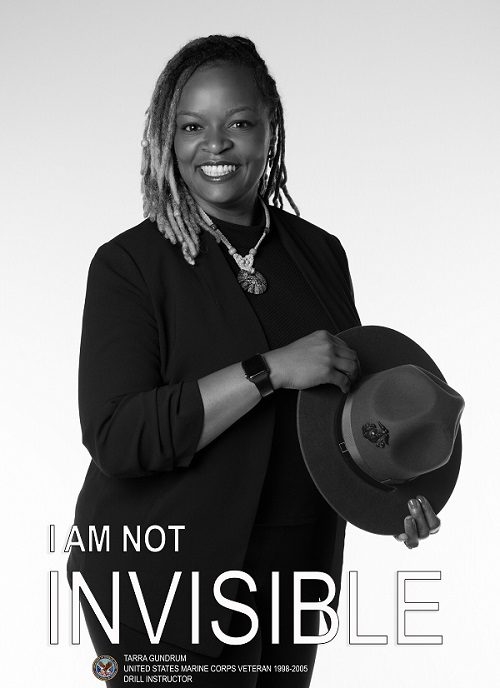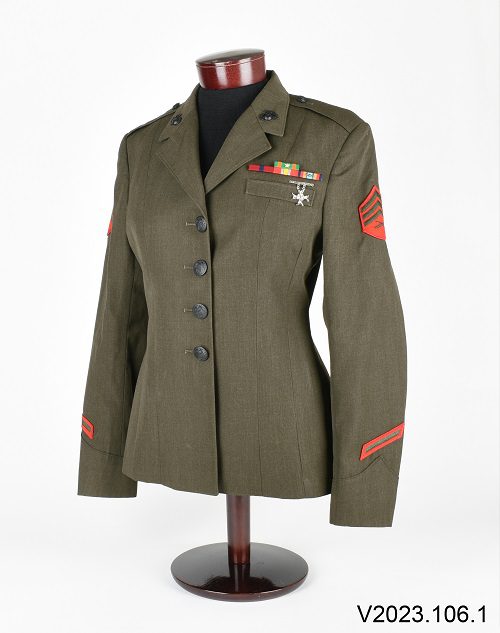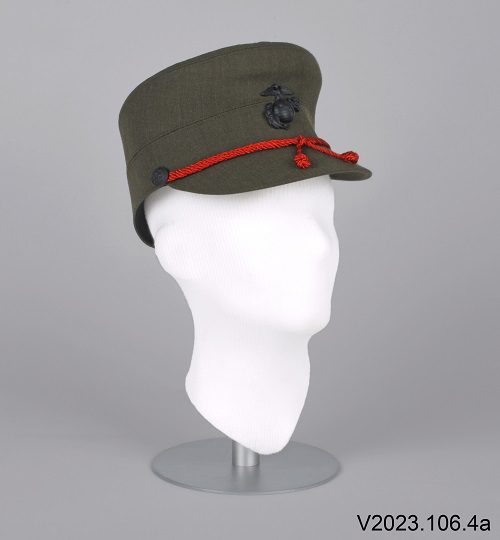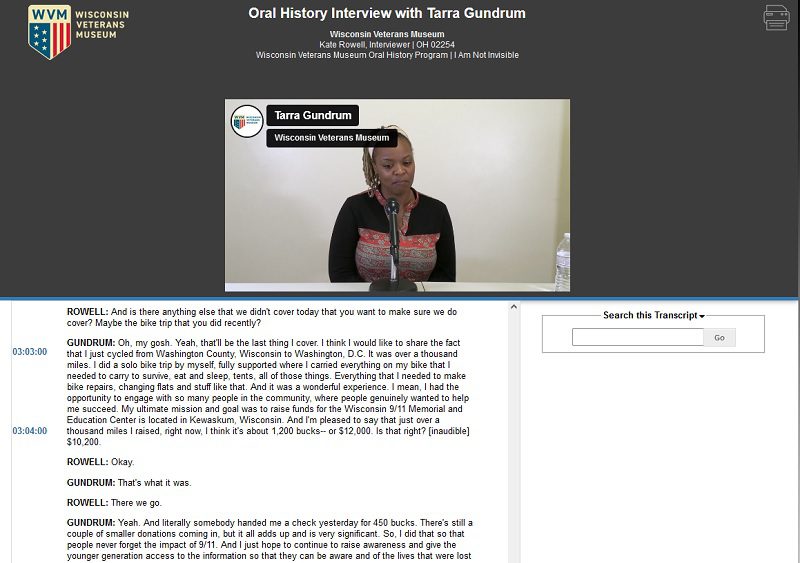
Tarra Rimone Pickens (later Gundrum) grew up in St. Louis, Missouri. She attended Cleveland Junior Naval Academy, an area Navy Junior Reserve Officer’s Training Corps (NJROTC) high school, and determined by the age of seventeen that she wanted to join the United States Marine Corps, enlisting in 1998 at seventeen-and-a-half and graduating from boot camp at Parris Island, South Carolina, around the same time her high school class was graduating. She then completed Marine Combat Training (MCT) at Camp Lejeune, North Carolina, followed by motor transport schooling at Fort Leonard Wood, Missouri.
Pickens chose to be stationed in Okinawa, Japan, where she served in Truck Company, Headquarters Battalion, 3d Marine Division at Camp Hansen. There, she took advantage of local opportunities and learned martial arts. Additionally, she made it onto the All-Marine Women's Basketball Team during this period and lived in Albany, Georgia, during the eight months she played for the team before returning to Japan.
She also met her future husband and fellow Marine, then-Corporal Jason Gundrum, while stationed in Okinawa and married him in 1999. When she became pregnant the following year, she was moved to the company office, where she did administrative work; then, after the birth of her daughter, she resumed regular duties in the motor pool, including dispatching and preventative maintenance.
After three years in Truck Company, Gundrum pursued her interests in martial arts and was accepted into the Marine Corps Martial Arts black belt instructor program at nearby Camp Courtney, Okinawa, along with her husband. Gundrum next completed the sergeant’s course at Camp Hansen, after which she and her family returned stateside, where she was accepted to drill instructor school at Parris Island.
She remained at Parris Island as a drill instructor until health issues led her to transition into quota work, removing her from the rigors of the drill instructor role. She was honorably discharged shortly after in 2005. From there, she joined her family, who were already living in Washington County, Wisconsin. She attended Moraine Park Technical College to pursue nursing starting in 2016 but instead settled into project management and executive assistant work. Currently, Gundrum serves as executive assistant/project coordinator to the Washington County, Wisconsin, executive.
Gundrum became active in community and veteran causes. She recently bicycled from Wisconsin to Washington, DC, to raise funds for the Wisconsin 9/11 Memorial and Education Center in Kewaskum, Wisconsin. Gundrum authored the book Finding My Possible: How I Changed my Narrative and Created a Life of Adventure in 2020 and began hosting The Possible Project podcast in March 2022.
Below are key excerpts from her oral history interview with the Wisconsin Veterans Museum Oral History Program on October 11, 2022.
Here, Gundrum talks about receiving her campaign cover as a Marine drill instructor:
GUNDRUM: [showing a hat] So this is my campaign cover. This is what I earned as a drill instructor. And this is what I wanted from the day I was in boot camp. And this is what my drill instructor was wearing. This is what I earned, and this is what she saw me receive. So, this means a lot to me. I was given this kind of cover press when I left the drill field, when I left my platoon, when I graduated, actually. And this is what I keep it in to keep the brim nice and flat. But yeah, this there's just stories all around this cover. I just wanted to share that.
INTERVIEWER: Is there anything else you want to say about it?
GUNDRUM: I just think that it is the most visual sign of hard work and representation of what the Marine Corps means. I think when anyone, Marine or civilian, sees that Smokey cover, they call it, I think you're going to think power, strength, endurance, focus, core values, and hard, hard work. I think that's what it represents. And to me, it represents that once you've achieved that or worn that like there's nothing that can stop you. I take that strength everywhere.
Gundrum on the qualities and values of a Marine drill instructor:
INTERVIEWER: And so, can you discuss what you feel are the most important qualities that were instilled in you as a drill instructor?
GUNDRUM: Gosh, it's interesting. It's the same qualities that are instilled in you throughout every other course that I've described, which are love for, you know, God, Corps and country. The core values of the Marine Corps, which is honor, courage, and commitment. I think that having a great moral background and an ethical line that you're not willing to cross for anything matters. And I think when you take that drill instructor pledge that you own it and you literally live it every single day. I think it's everything that I learned in the Marine Corps up until that moment and then throw on top those things that makes being a drill instructor so significant.
Gundrum explains her role as the "Kill Hat" as a drill instructor:
GUNDRUM: So, you're called the kill hat, and that means you do whatever you can to, within reason and within boundaries, break that platoon down as individuals and bring them up as a team. And so, your job is to just cause like organized chaos. They don't breathe. Like that's your job. All drill instructors do that to some level, but when you have four, you can kind of manage it that way. When you don't have four, you still do it the same and everybody takes their extra little bit of kill, right? I was kill hat my entire time down there. I was the youngest sergeant in the platoon because I had been meritoriously promoted to corporal and meritoriously promoted to sergeant. So, I was never going to be anything but the kill hat. So that was my role. I just remember driving myself crazy to maintain that. I mean I would do things like iron two or three uniforms and have them ready to go, two or three pairs of shoes shined, just like I did in drill Instructor School, never eating or drinking in front of the recruits. I was this superhero person that they never saw eat or drink or sleep. I would set my alarm in the middle of the night to get up to just go have a presence with the fire watch and then go back and then go back to sleep and then not eating, but sneaking, like cutting a peanut butter and jelly sandwich in half and putting one up under one boat blouse and one under the other and yelling at the recruits and running around the corner on the side of a 5-ton and slamming down a half of peanut butter jelly sandwich and going back out and yelling and then trying to eat more later. Running in the shower in full dress uniform, only to hurry it up and change into a dry one before they even get their clothes on. Like, things that makes the recruits go like, "What just happened?" You have to work hard to be that crazy person that makes them think that you're just super, like supernatural.
Gundrum on playing for the All-Marine basketball team:
INTERVIEWER: Is there anyone else you knew at that time at Camp Hansen who was formative for you or who really meant a lot to you?
GUNDRUM: I mean, that's probably it for the most part. There was this other-- I don't even know if I ever told you about this, but there's this lady. Her name is Gunnery Sergeant Best. She wasn't even in my command. She was in a different command. But I only knew of her from playing basketball at the gym. And so, she's the one who told me about something called All-Marine Team. And so, I tried out for All Marine basketball team and made it. So, I played All-Marine ball for like, I don't know, eight months. It was pretty amazing. And that was my job. Yeah. And it was all because of Gunnery Sergeant Best. I mean, like I said, she's in a different unit, I can't remember which one, but I go play pick up at the gym and she was there, and she was always someone that I-- she's kind of an idol of mine because she was older, but she was very experienced at playing basketball and she was very experienced at her job. So, for her to kind of take me under her wings was like, "Hey, you ever heard of All-Marine basketball? Well, if you try out--" basically it's kind of like division two level where you compare it to college, but you play against the Army, Air Force, Navy, and you also play against several other colleges in the area like of your same D2 status or whatever. So yeah, I went to-- I tried out for the team locally. I forgot how they did it. Oh yeah, we went to Albany [Georgia] and lots of people try it out and then if you made it, you stayed in Albany and that was your job for eight months, playing basketball for the Marine Corps. So, I had this super cool Marine Corps jumpsuits and backpacks. I still have the bag, but that was pretty amazing. So yeah, that's the only other thing that I like to mention. It was a wonderful time in my life in the Marine Corps.
Gundrum earns the platoon's respect on the physical fitness test:
INTERVIEWER: Yeah. Do you want to tell me about that platoon sergeant position and how you-- what that was like for you?
GUNDRUM: Yeah, so platoon sergeant was probably the game changer for me. Like I said, I always had been applying for meritorious opportunities or next level opportunities, and once I became platoon sergeant, I had a platoon commander, his name was Gunnery Sergeant Michael Clarke. He was so instrumental in my life in the Marine Corps, and he always kind of held me to a standard because I allowed him. I don't think that he forced me to the standard, but he knew that I wanted the best for myself. And so, I went to him, I was like, "Gunnery Sergeant, how do I gain the respect of a platoon?" Being a female platoon sergeant of all males, there's no other females, I'm the female. And he was like, "You can't have different standards." He's like, "If you want 100% respect, like you should be able to execute on their standards. And I'll help you do that and you're fully capable of doing it." And so, I wanted it. What that meant was it mainly came down to PFTs. Physical fitness test, and that is a female was required to do something called the flex arm hang for 90 seconds to get 100 points. A male was required to do 20 dead hang pull ups, all dependent on age and things like that, but that was kind of the category that I was in at the moment, and that's what they needed to do to get a hundred points. And then when you get to sit ups, I think sit ups were the same across the board, like 100 in 2 minutes or something, and then on the run, a female could do something like 24 minutes and a male had to do something like 19 to get 100 points. So, for a perfect 300 PFT, those were the standards. I was confident in my sit ups, not a problem. Pull ups, I had to work extremely hard on and running I had to work extremely hard on to achieve those standards. But Gunnery Sergeant Clarke would meet me. We would go run on the weekends. He would push me before and after work. Above and beyond the PT. And like I said, I wanted this, and he wanted it for me because I wanted it. So, he was willing to put in the work to help me. But he also had the confidence that I could achieve it. And so that was extremely instrumental. And I remember the day I got a perfect PFT, and I remember I was in sergeant's course, and I had successfully completed the pull up portion and the sit up portion already, and I was on my run and I knew the timing that I had to keep and the pace. And there's a pacer that's around, kind of like the checkpoints, that will start calling out. Probably you can hear this person about 100 yards prior to your arrival at that person, but they're calling out like 18:30, 31, 32, so you can kind of hear where you are. And I remember being on my own for the first like, mile and maybe a mile and a half. And then out of the blue, this guy comes. It's Gunnery Sergeant Clarke and he runs with me for, I don't know, another mile or so. And then I just remember him, us catching up on how sergeant's course was going, how him telling me that I was at a good pace, and I was doing well. But then I also remember him saying, "Well, this is the end of the road for me. If you want it, go get it." And he veered off and he was just gone. And I just ran the way that I knew how. And I think I finished like under a minute from the perfect male PFT. And so that was extremely significant. When you talk about my role as a platoon sergeant, I think achieving that and going back to the guys, even though when I went back to the guys was only for a small amount of time because I was on a different mission, was 100% complete respect. Yeah. It was good.
On cycling from Wisconsin to Washington, DC, to raise funds for the Wisconsin 9/11 Memorial and Education Center:
GUNDRUM: I think I would like to share the fact that I just cycled from Washington County, Wisconsin to Washington, D.C. It was over a thousand miles. I did a solo bike trip by myself, fully supported where I carried everything on my bike that I needed to carry to survive, eat and sleep, tents, all of those things. Everything that I needed to make bike repairs, changing flats and stuff like that. And it was a wonderful experience. I mean, I had the opportunity to engage with so many people in the community, where people genuinely wanted to help me succeed. My ultimate mission and goal was to raise funds for the Wisconsin 9/11 Memorial and Education Center its located in Kewaskum, Wisconsin. And I'm pleased to say that just over a thousand miles I raised, right now, I think it's about 1,200 bucks-- or $12,000. Is that right? [inaudible] $10,200.
Gundrum talking about her recently published book, Finding My Possible:
GUNDRUM: So, I published a book called Finding My Possible, and what it ended up being was just kind of like reflection of my life, which is the story of how I became the person that I am today and I guess, for me, it was explaining the fact that no one person really excels in life by themselves 100%. It's through the help of community and mentors and teachers and coaches that one can excel. It's other people finding some sort of positive energy or strength in you and having the confidence in you and being willing to mentor you that will help you excel and be the person that you are today. So, I felt it necessary to share my story, not just to talk about myself, but to show that in every single aspect of my life I was impacted by someone else in that in some small part, I believe everyone can touch another person. So that's me finding my possible through the generosity of other people in hopes that other people would find inspiration in that message and do the same for someone else.
Part of the Gundrum Collection at the Wisconsin Veterans Museum:

Coat, Service Green, United States Marine Corps

Cap, Green Service, United States Marine Corps
Watch, explore, and search the complete interview by clicking on the image below:


